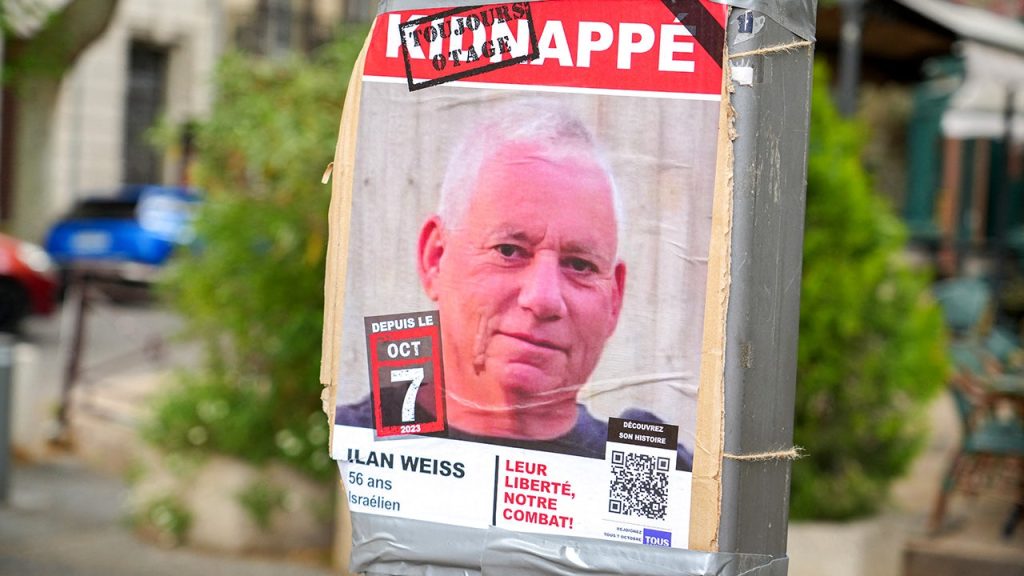Israeli Hostage’s Remains Recovered After 693 Days in Gaza: A Family’s Bittersweet Reunion
In a poignant development in the ongoing Israeli-Hamas conflict, the Israeli Defense Forces (IDF) announced Friday that they had recovered the remains of Ilan Weiss, who had been held hostage in the Gaza Strip for 693 days. Weiss, a resident of Kibbutz Be’eri, left his home on the morning of October 7, 2021, to join the kibbutz emergency response team when Hamas attacked. He was murdered and kidnapped during what Israel refers to as the “October 7 Massacre.” His wife Shiri, 54, and daughter Noga, 19, were also taken hostage but were fortunately released during a ceasefire deal in November 2023. The recovery operation was conducted jointly by the IDF and Israeli Security Agency. On the same day, the body of a second Israeli was also recovered and is currently being identified.
The recovery brings a complicated mix of emotions for the Weiss family and the wider Israeli community. Rubi Chen, whose son is believed to still be in captivity in Gaza, described the moment as “bittersweet” – the Weiss family is reunited with their loved one, though not in the way they had hoped. Chen’s situation highlights the ongoing anguish for many families; despite intelligence suggesting his son Itay did not survive the October 7 attack, Hamas has provided no information about his whereabouts, leaving the family in painful limbo. According to the Israeli Hostages and Missing Families Forum, Ilan Weiss was “a devoted family man – humble, principled, and a dedicated father to his daughters.” Those who knew him remember a man who loved hosting guests, tending to his garden, and enjoying a beer. On weekends, he would go mountain biking with his brother-in-law Gil Boyum, who was also a member of the kibbutz emergency team and was killed during the same attack.
The recovery of Weiss’s remains occurs against the backdrop of a larger hostage situation that continues to unfold. As of Friday, 48 hostages remain in Gaza, with only 20 believed to be still alive, according to The Times of Israel. This ongoing crisis has become a central issue in Israel’s military operations in Gaza and in international diplomatic efforts to resolve the conflict. The plight of these hostages has galvanized Israeli society and has been a significant factor in shaping the government’s military and political strategy in the region. Each recovery of remains or release of hostages is both a reminder of the human cost of the conflict and a moment of national significance that reinforces Israel’s commitment to bring all hostages home – whether alive or deceased.
Israeli President Isaac Herzog expressed his condolences to the Weiss family and the community of Kibbutz Be’eri, acknowledging Ilan’s courage and “noble spirit” in fighting against terrorists on “that dark day.” Herzog’s statement reflects the deep national sentiment surrounding the hostage issue, emphasizing that “in his death, he gave life.” The president also commended the Weiss family for showing “extraordinary strength in their struggle for his return.” Herzog’s message underscores the Israeli government’s position that the actions of Hamas – “murder, torture, abduction” – constitute “crimes against humanity” and calls for the international community to “show moral clarity, apply pressure, and act for the immediate release of all the hostages.”
The recovery of Weiss’s remains highlights the complex human dimension of the Israeli-Palestinian conflict. Beyond the geopolitical calculations, military operations, and diplomatic negotiations lies the profound grief of families torn apart by violence. For the Weiss family, the recovery brings a measure of closure after nearly two years of uncertainty and anguish. For others like the Chen family, the wait continues with diminishing hope. The situation illustrates how the trauma of the conflict extends far beyond the immediate violence, creating wounds that will take generations to heal. It also demonstrates how personal tragedies become intertwined with national narratives and political imperatives, as individual stories of loss and resilience become symbols of broader struggles.
President Herzog’s vow that Israel “will not rest until every one of them is brought home, the living to the loving embrace of their families, and the fallen to be laid to rest in dignity. Every last one,” reflects a national consensus that transcends political divisions within Israel. The recovery of hostages – whether alive or deceased – has become a moral imperative that unites Israeli society even as other aspects of the conflict remain deeply divisive. As the conflict continues, the fate of the remaining hostages remains a central concern for Israelis and a significant factor in any potential ceasefire or peace negotiations. The story of Ilan Weiss – his life, his capture, and the recovery of his remains – is but one chapter in a much larger narrative of human suffering that continues to unfold in a region that has seen too much bloodshed and too little peace.


